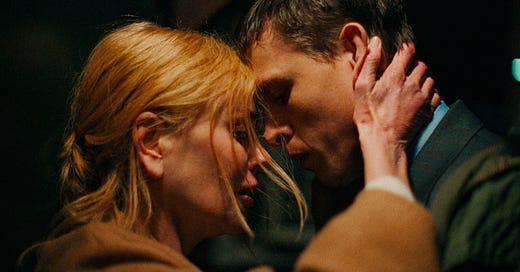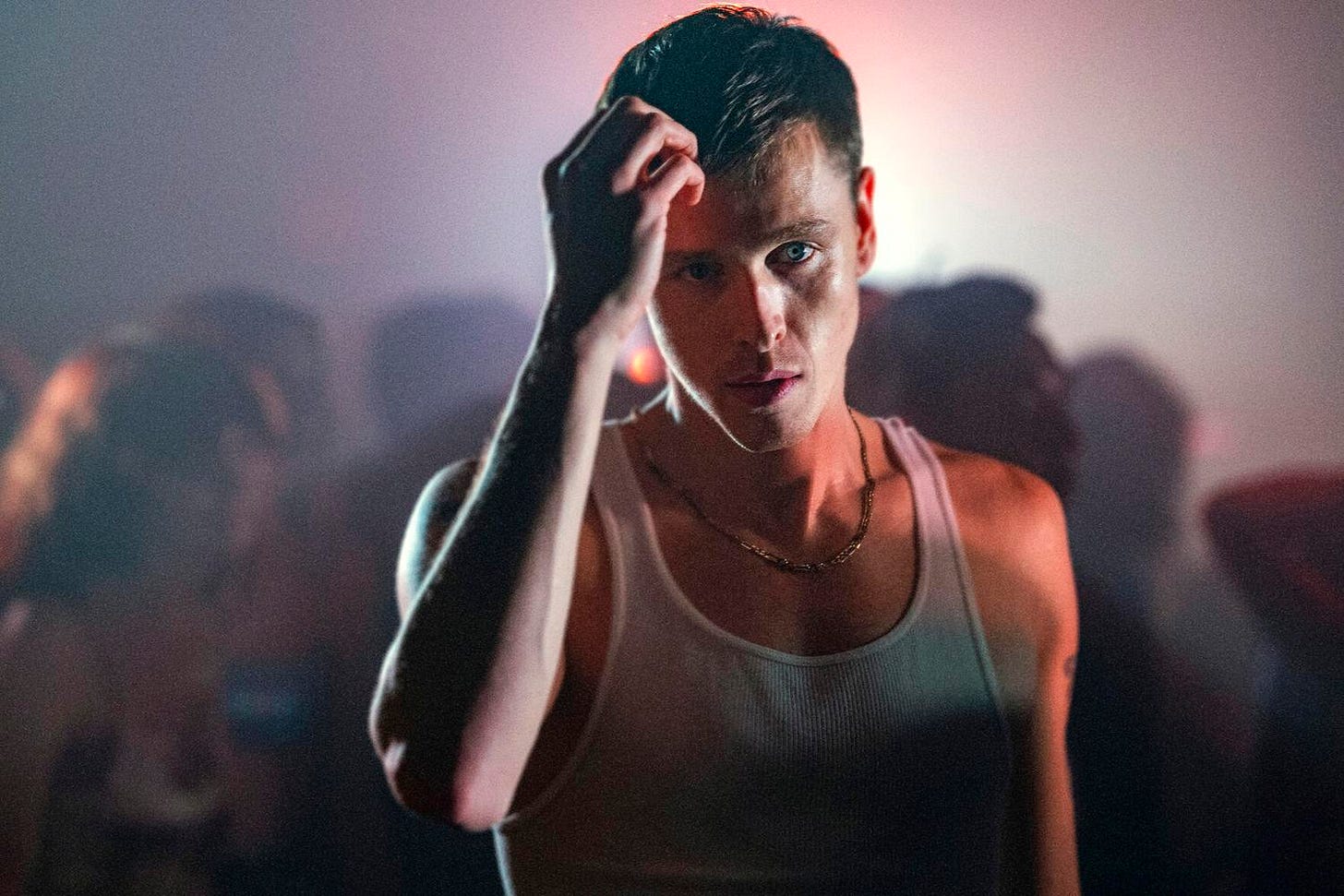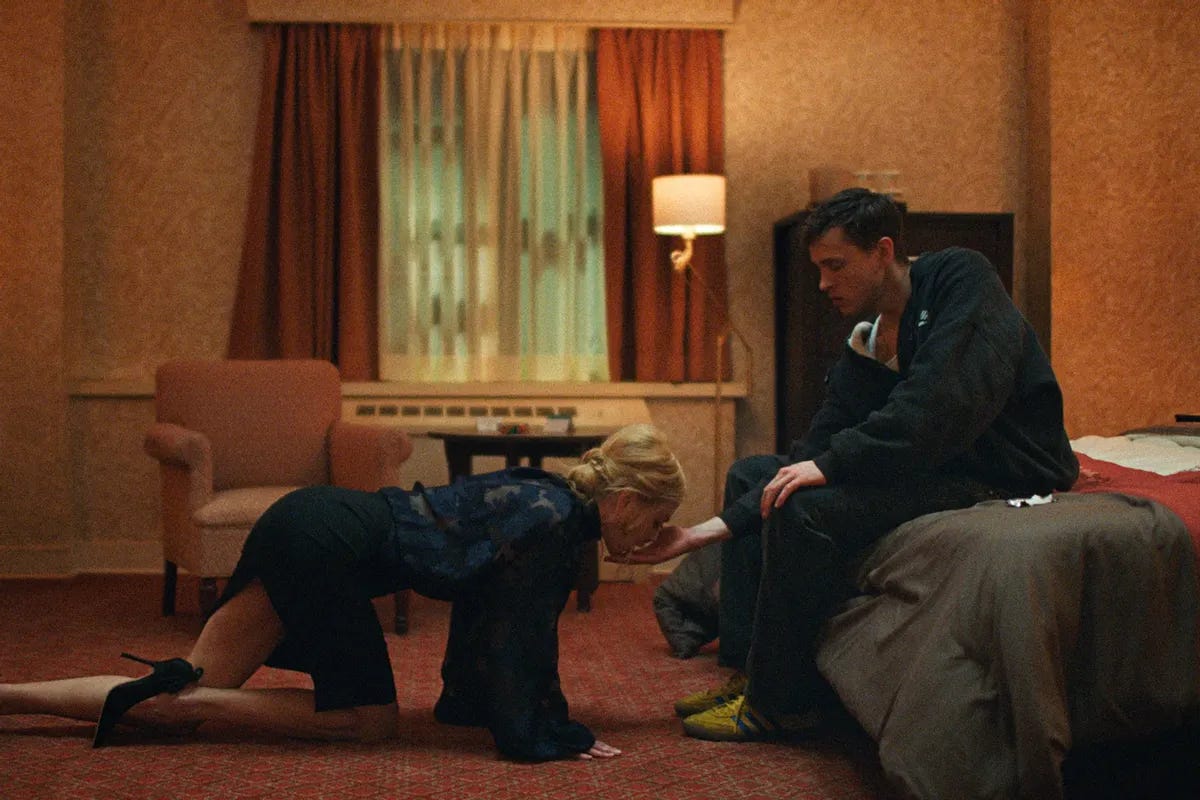Ok Babygirls now let's get in formation
The undeniable power, originality, heat, and nuance of the female gaze
Hello new subscribers! I’m splitting my commentary on the movie Babygirl into two parts: Part 1 is a cultural and critical look at Babygirl. Part 2 will be a much more intimate essay about my own experiences of being a Babygirl. I am “lightly” paywalling this post once it turns personal. Part 2 will be paywalled from the jump and I will not be promoting it on social media either, so subscribe now to get it when it drops! And if you’re related to me or work with me, I invite you to flee for the hills now.
If you don’t know what Babygirl is, you can watch trailers here and here. 🚨This post contains spoilers galore🚨
The female gaze is no joke.
I believe most men know this—viscerally and profoundly. Let’s face it, they deal with the actual female gaze all the time. It’s why our insights, preferences, and perversions are ignored or suppressed or both. It’s why the entertainment, trends, and stories we love are belittled or deemed unserious.
Because what does the female gaze matter if it historically impacts almost nothing at all? What does it matter if it doesn’t inform the movies (or porn) you watch or the books you read? What does it matter if it’s never taken seriously financially? Can you imagine a man singlehandedly impacting a local economy on the scale of the 2010 Olympics as Taylor Swift and her female fan base did in Vancouver and being anything but celebrated and revered? I can’t. What does the female gaze matter in a patriarchy where the stifling majority of everything caters to a male point of view, to male desire? What does it matter in a society that hand wrings over what’s wrong with men WHAT ABOUT THE MEN at the same time women are being threatened with the death penalty for wanting to control their own bodies? Both things can be true, men can be broken and lonely, but it’s a hell of a thing to elevate and repeatedly put on the front page above government-endorsed gender-based death threats. Ultimately what does the female gaze matter if it’s just a nice little film studies theory or, essentially, a party game?
I’ll admit, I used to think that the female gaze was just a straight switcheroo of the male gaze. I think Hollywood continues to believes this, too. That all you have to do is put a lady in the man role or the director role and there you are. Female gaze, or some sort of equality anyway, achieved. I was reminded of this, actually, during one of the previews before Babygirl. It was for Ballerina. I sat there thinking about how I’m not interested in seeing women as killing machines the way men are seen as sexy glossy ripped killing machines. Shockingly, this is not progress to me.
If I wanted to see women murdering vast quantities of people regardless of her backstory or justifications, I’d want to see her using the dark tools that the patriarchy has “gifted” her as twisted survival mechanisms—15-steps-ahead emotional intelligence, social media stalking, cutting personal observations, eviscerating insults, and the ability to inflict eating disorders, suicidal ideation, and crippling low self esteem on their enemies. Kill ‘em that way, honey, I’d watch.
But here comes Babygirl, on the (high) heels of a hot streak of brazenly horn-dog-middle-aged-female-gaze cultural highlights like All Fours, and unsurprisingly I’ve seen some real bad takes. Like how men would never be able to make a movie like this if the roles were reversed or the director was a man and all I have to say to that is: a) are you fucking joking? and b) grow up. The entire history of cinema, not to mention the actual real world age differences in casting leads, is built upon the foundation of more powerful older men and less powerful younger women, both as characters and in real life. In other words: WE LEARNED IT BY WATCHING YOU, ALRIGHT?
I think it’s important to point out that with Babygirl we’re not talking about just any female gaze, we’re talking about a Dutch female gaze. Babygirl’s writer and director, Halina Reijn, is Dutch. That matters. She’s also 48. That matters, too. Her specific and robust vision and talent aside, these two data points are crucial to how this film organically lands. They help build the case for why Babygirl feels fresh, visceral, nuanced, and unapologetic.
Dutch sex education is known for being extraordinarily progressive. It accepts sex as natural but also requiring clear-eyed and age-appropriate guidance and openness. Sex isn’t put in a pervy little box. From the opening shot in Babygirl, sex is intertwined with life, not separate from it. This isn’t the stereotypical “bad” American marriage we see onscreen or even in books or actually live day-to-day where the partners quietly seethe at each other and never touch. Romy (Nicole Kidman) and Jacob (Antonio Banderas) are tender with each other, they kiss and touch frequently and say “I love you” intimately, even if, um, he hasn’t made her come* once in 19 years and isn’t even aware of that fact.
This is the “good enough” marriage that haunts so many women. What exactly are you complaining about? But he’s so good looking. Does he hit you? No? Oh you’re just unhappy? Oh god, join the club. Shut up. Go to yoga. Write in a gratitude journal. How hard could it possibly be?
Dutch sex education treats sex as an essential part of life. From The Atlantic [from 2018]:
In Dutch schools that use the country’s most popular sex-ed curriculum, Kriebels in je buik (Butterflies in Your Stomach), yearly lessons begin with 4-, 5-, and 6-year-olds talking about differences between male and female bodies, learning about reproduction, and discovering their own sexual likes, dislikes, and boundaries. Third-graders learn about love, including how to be kind to your crush. Before middle school, children get lessons on sexual diversity, gender identity, deciding when to have sex, and how to use barriers and contraceptives. All along, students are schooled in healthy relationships and how to reject gender-role stereotypes.
And from PBS [from 2015]:
By law, all primary school students in the Netherlands must receive some form of sexuality education. The system allows for flexibility in how it’s taught. But it must address certain core principles — among them, sexual diversity and sexual assertiveness. That means encouraging respect for all sexual preferences and helping students develop skills to protect against sexual coercion, intimidation and abuse. The underlying principle is straightforward: Sexual development is a normal process that all young people experience, and they have the right to frank, trustworthy information on the subject.
Again from The Atlantic:
The Netherlands now outperforms most countries on various global metrics for sexual-health outcomes. On average, Dutch and American teenagers have sex for the first time around the same age—between 17 and 18—but with dramatically different results. Teen pregnancy has been on the decline in the U.S. for the past three decades, but American teenagers still give birth at five times the rate of their Dutch peers, who also have fewer abortions. In the United States, people under 25 make up half of all new STI cases each year, while young people in the Netherlands account for 10 percent of new cases in the country. Socially, sex is different, too: Sexually active young people in Holland sleep around less, communicate more often with their partners about their likes and dislikes, and report higher rates of sexual satisfaction.
Americans are taught fear. Fear of pregnancy, fear of STIs, fear of desire, fear of fantasy, fear of sex in general. We’re taught sex is dangerous and best to be avoided. We’re taught, in the absence of reliable and accurate information, that porn is the only sex education, that what we see there is how everyone’s doing it and what everyone (especially women) like because: male gaze. Or, stay with me through the whiplash, we’re taught that sex is only for marriage and the creation of children and let me tell you, if you ever want to kill your sex life dead then yes by all means get married and have children. What else can be said about American sex education other than it’s not sex and it’s not education but it’s definitely American: discuss.
It’s probably why there’ve been reports of audience members giggling during Babygirl. Americans do not know what to do with themselves when faced with female-gaze-grounded sex and desire, especially older female desire. They don’t know what to do with sex that’s inferred through depth of focus and the non-performative animal-like sounds of true female orgasm instead of the blow-up-doll 1-2-3 simplicity of dudes wanking on women’s faces (not to yuck anyone’s yum or anything). We’re taught to be so uncomfortable with hungry women, especially ones that don’t immediately get what’s coming to them. Where’s the retribution for God’s sake?
In one interview Reijn shares how Babygirl is also very much about generations, which I found even more striking when I watched it a second time. While that’s obviously true given the age difference between Romy and Samuel (Harris Dickinson), the most nuanced exploration of the generational perspective on sex and sexuality come through various tension-filled interactions between Romy and her oldest daughter, Isabel (Esther McGregor).
Sex is intertwined and present in Isabel’s life. She has a girlfriend, asks for her to sleep over, her parents support the relationship (although not the sleeping over, so American). Later in the film Romy glimpses Isabel in the pool at their country house, in the middle of the night, kissing another girl. Maybe she’s non-monogamous, maybe she’s in an open relationship, she is Gen Z after all. Defining the relationship isn’t the point in that moment (although we find out later that, yes, she was cheating and has since been forgiven).
There’s generational tension over what being an older woman looks like and means too, especially when her daughter openly mocks Romy for cosmetically messing with her face, saying she looks like “a dead fish.” Much later in the film, Romy attempts to tiptoe back into the house in the dead of night after being at a rave with Samuel and is startled by Isabel in the kitchen. You can practically smell the sweat, the weed, the sex, the hangover on her. She genuinely looks like she’s been through an alcohol/semen/sweat carwash backward, yet reaches for her mother persona and its standby phrases while Isabel looks justifiably alarmed and upset—she’s fine, just overworked, hey it’s bedtime. These words are soft, a bit mushy, in her mouth. She’s a goddamn mess. Uncontrolled and clearly uncontrollable at least for one night. Isabel doesn’t know what to do with this new presentation of her mother.
Toward the end of the film, Isabel is the one to shrug off what she assumes was an affair on Romy’s part. Sex is sex, hunger is hunger, she knows firsthand that forgiveness is available, please just come home. To take it a step further, I wonder if there’s a recognition between the characters there, Isabel’s sex drive had to come from somewhere, right? We don’t just get our hair color or body types from our parents. Do they recognize that in each other? Does it soothe their conflict? It feels like it.
These generational divides also come through Romy and her assistant, Esme (Sophia Wilde). She’s dating Samuel, too—“normal person” dating—although he’s an intern, a point Romy lightly threatens her with, this differential in power, in a fucked up and enjoyable moment of high hypocrisy. All along Esme had expected Romy to be better because she’s a woman, that she would look out for Esme and promote her as she had long promised to do. But Romy had dangerously put it off too long when Esme is handed the golden opportunity to blackmail her to get what she wants and actually deserves. But she’s not going to oust her, oh no, she knows she needs the cover of a woman in that position to keep her safe. Honestly, it’s pretty delicious, and almost erotic in its own way.
Then of course there’s Samuel. Even though he’s in his twenties and thus not a fully defined nor known human being (not even to himself), he intuitively understands the dominant-submissive power dynamic. He senses Romy’s desire and her need to be unleashed. He sees her. Men need to actually pay attention to women closely enough—with curiosity—to see them and this is where most men fail. Romy hasn’t been seen by her husband in 19 years. But Samuel sees her and senses what she wants. Even as they sink and battle deeper into their dynamic, he never once assumes that it’s an actual romantic affair, an on-ramp to something monogamous and long-lasting, or god forbid marriage. It’s actually preposterous to even think so. And it’s not going to end in murder either, which is the American way. This is play. It’s dangerous, thrilling, extremely hot, life-derailing play, but it is play nonetheless.
Reijn incorporates several details from her own life into the film. That milk scene? A version of that happened to her in real life. The long marriage without the wife having an orgasm at the hands or mouth or cock of her husband? Based on a friend’s marriage. She grew up in a cult, she uses Botox and filler, and has had EMDR therapy. These are not fairy tales. Yes, this film is a fantasy, yet it’s not exactly fiction, is it?
What does it say that the most interesting books and films created by women about midlife and desire and relationships and sexual fantasy, have all been autofiction to some degree?
Related, I’m thoroughly obsessed with this quote from Reijn:
“She said that the actor [who sent her the milk] never, unfortunately, said ‘good girl to me’ as Samuel does. ‘I wish he did. He just walked out. I didn’t have sex with him or anything. But when I was writing, I did think that was one of the most arousing moments of my life. There wasn’t even touching. That is what fascinates me about sex. To me, real, shocking sex is often not at all two bodies banging into each other. To me, real, shocking sex is about what is in the mind. It’s all suggestion. It’s all imagination. [Romy] crawling around on a dirty carpet with stains and licking a little bit of candy out of his hand, and him petting her like she’s an animal — that, to me, is really sexy. Real sex acts to me onscreen are quite boring.’”
Would an American director, regardless of gender, have played so much with the many shifts of power, both overt and subtle, between Samuel and Romy? In the beginning we—as American women who are taught to be afraid of everything, but especially men—assume Samuel is obsessive, perhaps a stalker. But the dynamic shifts begin early on. He’s playful, admonishes her to not drink so much coffee. She finds his tie on the floor after the office holiday party and tucks it into her bag for later. Every time we think she has power, he upends it. When we think she is losing power (and she loses it often), he sparingly acquiesces. He asks to be held exactly once. She holds him. He frequently walks away from her without looking back even once. This simple detail, devastating. He leaves her wanting more, often. She instinctively knows he’s her only gateway into the fantasies she’s held so deeply for so long, he’s the only one (but unlikely to be the last one) to unlock this for her. That’s his actual power. He can read her. And he can read her desperation in a way her own husband refuses to see or accept or help relieve.
Keep reading with a 7-day free trial
Subscribe to HONEY STAY SUPER to keep reading this post and get 7 days of free access to the full post archives.








